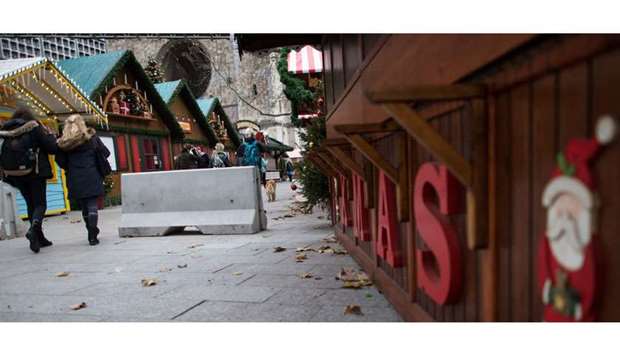On December 19 last year, Max Mueller and his wife were selling pretzels, mulled wine and baguettes at their booth in the Christmas market near Berlin’s Kaiser Wilhelm Memorial Church.
Then, suddenly, the booth was destroyed – “collapsed like a house of cards” is how the 26-year-old calmly described it.
“I was standing in front of the booth when the lorry raced past me, just a metre away and the booth crashed. I pulled my wife out from underneath,” said Mueller, a sixth-generation stallholder.
It is now going on a year since the Anis Amri raced a stolen lorry – which he captured after killing the Polish driver – into the crowded Christmas market.
The rampage killed 11 and injured 70 others.
The Muellers survived, unscathed at least on the outside.
“We had a good guardian angel,” they say.
This year, Max and his wife Katalina, 22, are not returning to their usual spot in the Christmas market located on the Breitscheidplatz square.
For it is precisely on that spot that on November 27 a memorial marker – a golden crack inlaid in the pavement – will be unveiled with the names of the 11 killed.
So the Muellers will be opening their stand this year a bit further on, next to a new high-rise building.
“I don’t know yet what my feelings will be when the hustle and bustle starts,” admits Katalina.
Max says he often hears people telling him: “Just be happy you survived. You were lucky.”
Mueller however seems restless, constantly checking his watch, his appointment book, gesticulating in a loud voice.
“I have suppressed he emotional side somewhat. I try for a practical approach,” he says, while noting how he and Katalina had met twice with pastors to talk it through.
The couple had also been offered a yoga course to help them regain a sense of harmony in their lives.
“That wasn’t my thing,” Mueller says. “My wife was into it more strongly.”
Mueller doesn’t want to be seen as a victim. “I don’t have room in my head for that. I am head of this company and have four employees, so I have to look forward.”
And yet something of what happened stays with him and often gives him pause: the sound of the lorry when it raced past him on its deadly rampage.
“Like when a garbage container is being emptied – rough and rattling,” he said.
The young businessman is convinced that the attack would have been more devastating had it taken place on a weekend: “The market would have been much more crowded. More people would have been hit.”
In the aftermath of the attack, when the picture of Amri, who was shot dead while on the run in Italy, were repeatedly shown in the newspapers or television, Mueller stopped watching the news.
“I didn’t want to see that face any longer,” he said.
Then, as more and more reports about the failure of police authorities regarding their monitoring of Amri came to light, “my anger grew and grew”, Mueller said.
Above all, the question of how the Tunisian who had a criminal record and who had actually been rejected for asylum was not stopped beforehand.
Echoing the feelings of many, he says many criminals had arrived in Germany amid the stream of refugees in the past few years.
“And many violence-prone types are still running around. Can somebody explain it to me? I expect a rule-of-law state to protect me,” Mueller said.
Mueller, who has belonged to the centre-right Christian Democrats party of Chancellor Angela Merkel since he turned 18, says Germany urgently needs an immigration law.
“Anyone who integrates here is welcome,” he says.
Those not interested in living peacefully together should not be here.
Last year, right after the attack, most of the more than 100 traders and booth operators at the market were in agreement: “We are not going to be pushed away by terrorists, we won’t give them any space. We want to open up again.”
For many of them, their economic livelihood was at stake.
Michael Roden, head of the Berlin stallholder’s association, told DPA that nearly all the booth operators are back this year.
Only a single merchant did not wish to return.
“Life goes on. We have families, obligations. We are entrepreneurs and the clocks have to keep ticking,” he said.

People walk past concrete barriers as preparations are under way for a Christmas market in front of the Kaiser-Wilhelm-Gedaechtniskirche (Kaiser Wilhelm Memorial Church) in Berlin, almost one year after a religious extremist hijacked a truck and ploughed into shoppers at the Christmas market here, killing 12 people. The Christmas market at Breitscheidplatz will open for the public from tomorrow to January 7, 2018.
